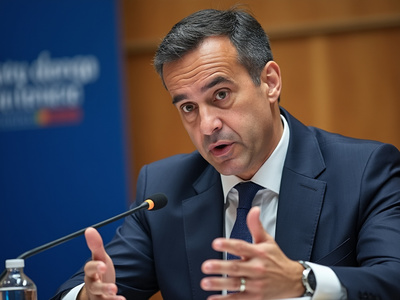
Ayuso Accuses Spanish Government of Prohibiting Military Parade for May 2 Celebration
The President of the Community of Madrid criticizes the national government for its handling of regional matters and the ongoing media scrutiny regarding pandemic management.
Isabel Díaz Ayuso, the President of the Community of Madrid, has publicly accused the Spanish government of prohibiting the traditional military parade scheduled for the May 2 celebrations, marking the anniversary of Madrid's uprising against French occupation in 1808. In her statements, Ayuso described the government's actions as part of a broader 'persecution' against the regional government, claiming that this marks the first time the military has been separated from the people of Madrid during this significant event.
She referred to this separation as 'painful' and stated that it disturbs the commemoration of what she termed the 'most important day for the Community of Madrid.'
Ayuso emphasized the strong bond between the people of Madrid and the Spanish Armed Forces, asserting that the military is 'respected and venerated' in the region.
She has consistently defended the Armed Forces, labeling them as 'exemplary, modern, and supportive.' Notably, she highlighted that the military's participation in this annual celebration has been uninterrupted since the tenure of Joaquín Leguina, Madrid's first regional president from the Socialist party, who held office for 12 years.
Regarding the military's past involvement, Ayuso recalled the events of May 2, 2024, which featured aerial displays by the Air and Space Army's Parachutist Patrol and a parade with troops from various branches of the military, including the Navy and the Air and Space Army.
In a separate matter, Ayuso responded to a documentary titled '7,291,' which scrutinizes the management of the COVID-19 pandemic in the Community of Madrid.
She condemned the broadcast by Spanish public broadcaster RTVE, describing it as an unprecedented media deployment aimed at criticizing her administration's response to the pandemic.
She expressed that families affected by the pandemic have reached out to her, requesting that their suffering not be used for media narratives.
Ayuso argued that her government faced unfair media scrutiny described as 'tremendously harsh' during the pandemic, when Madrid was referred to as a 'viral bomb' amidst rising infections.
She defended the regional government’s pandemic management, claiming it acted decisively ahead of other regions despite facing criticism.
Ayuso accused the national government of imposing 'arbitrary closures' and restricting regional governments from procuring necessary medical supplies, alongside decisions purportedly based on a 'committee of experts' whose credibility she challenged.
She referred to this separation as 'painful' and stated that it disturbs the commemoration of what she termed the 'most important day for the Community of Madrid.'
Ayuso emphasized the strong bond between the people of Madrid and the Spanish Armed Forces, asserting that the military is 'respected and venerated' in the region.
She has consistently defended the Armed Forces, labeling them as 'exemplary, modern, and supportive.' Notably, she highlighted that the military's participation in this annual celebration has been uninterrupted since the tenure of Joaquín Leguina, Madrid's first regional president from the Socialist party, who held office for 12 years.
Regarding the military's past involvement, Ayuso recalled the events of May 2, 2024, which featured aerial displays by the Air and Space Army's Parachutist Patrol and a parade with troops from various branches of the military, including the Navy and the Air and Space Army.
In a separate matter, Ayuso responded to a documentary titled '7,291,' which scrutinizes the management of the COVID-19 pandemic in the Community of Madrid.
She condemned the broadcast by Spanish public broadcaster RTVE, describing it as an unprecedented media deployment aimed at criticizing her administration's response to the pandemic.
She expressed that families affected by the pandemic have reached out to her, requesting that their suffering not be used for media narratives.
Ayuso argued that her government faced unfair media scrutiny described as 'tremendously harsh' during the pandemic, when Madrid was referred to as a 'viral bomb' amidst rising infections.
She defended the regional government’s pandemic management, claiming it acted decisively ahead of other regions despite facing criticism.
Ayuso accused the national government of imposing 'arbitrary closures' and restricting regional governments from procuring necessary medical supplies, alongside decisions purportedly based on a 'committee of experts' whose credibility she challenged.
Translation:
Translated by AI
AI Disclaimer: An advanced artificial intelligence (AI) system generated the content of this page on its own. This innovative technology conducts extensive research from a variety of reliable sources, performs rigorous fact-checking and verification, cleans up and balances biased or manipulated content, and presents a minimal factual summary that is just enough yet essential for you to function as an informed and educated citizen. Please keep in mind, however, that this system is an evolving technology, and as a result, the article may contain accidental inaccuracies or errors. We urge you to help us improve our site by reporting any inaccuracies you find using the "Contact Us" link at the bottom of this page. Your helpful feedback helps us improve our system and deliver more precise content. When you find an article of interest here, please look for the full and extensive coverage of this topic in traditional news sources, as they are written by professional journalists that we try to support, not replace. We appreciate your understanding and assistance.











